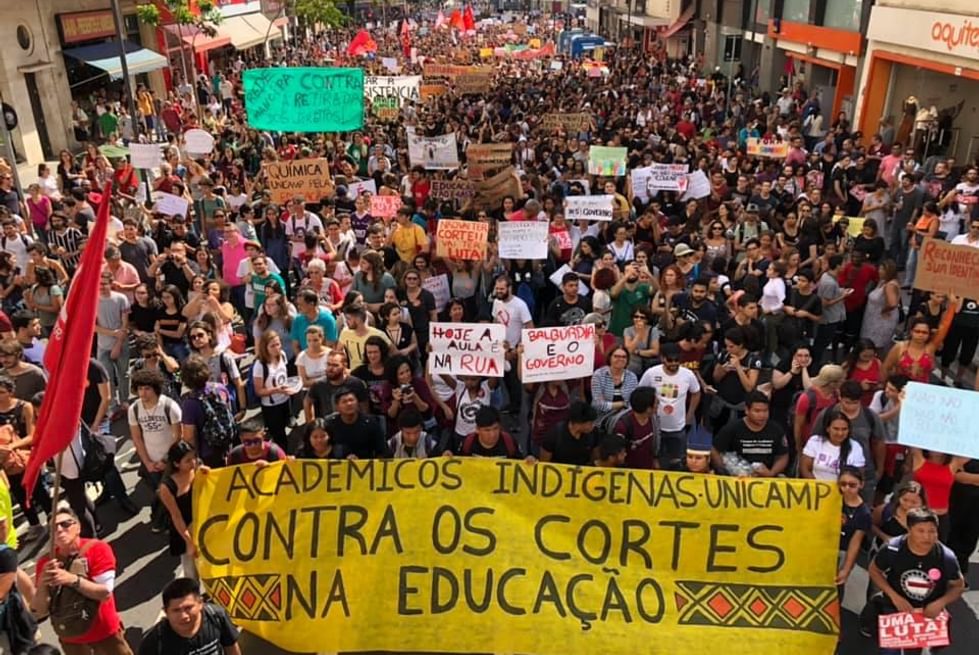Cataclysm Presaged in Indigenous Lands
From the Series: Bolsonaro and the Unmaking of Brazil
From the Series: Bolsonaro and the Unmaking of Brazil

Translated by Luiz Costa
Amazonia and Indigenous peoples have become primary targets of the country’s far-right government. In what pertains to environmental and Indigenous policies, President Bolsonaro has put into effect exactly what he promised during his campaign. As with every previous government, the Amazon region only acquires importance because it is considered to be a source of land and riches that can be explored and exploited by agribusiness, mining interests, and other extractivist and energy production endeavors strategic to the developmentalist economic model that has been privileged in Brazil since the military dictatorship.
The added difficulty is that the current government makes no effort to conceal its disdain for environmental and Indigenous issues, encouraging the use of violence and dismantling government agencies and institutions that ensure the protection of these areas and the rights of the peoples that inhabit them. We are no longer dealing with attempts to weaken legislation, but instead with the explicit aim of deregulating the legal apparatus and annihilating its institutions so as to free up land for economic exploitation, putting at risk the lives of the Indigenous peoples. It was not enough to have proclaimed that, during his government, not a single centimeter of Indigenous land would be demarcated—having lands demarcated is a right that, to be clear, is enshrined in the Constitution. In the forests and in the fields, the president’s anti-Indigenous rhetoric proclaims a license to kill and to invade protected areas.
Furthermore, when confronted with violence against Indigenous peoples, Bolsonaro avoids critical pronouncements. He minimizes and denies it. His disregard affects the degradation of the living conditions of Indigenous peoples of the country and advances environmental devastation. Thus we are witnessing catastrophic scenes, surpassing what we saw decades ago, even during the period of military dictatorship.
At present there are some twenty thousand goldminers in the Yanomami Indigenous Land (straddling the states of Amazonas and Roraima), bringing with them disease, prostitution, alcoholism, and poisoning the rivers with mercury and iodine. We are transported back to the 1980s, when these people’s lands were invaded by some forty thousand goldminers, and one-fifth of their population was extinguished within seven years. This earlier invasion of Yanomami lands culminated, in 1993, with the Haximu Massacre, in which sixteen Yanomami were tortured and assassinated by goldminers. The crisis was overcome only through the effective demarcation of the Indigenous Land, the decree having finally been signed in 1992. The Brazilian Constitution is a fundamental guarantee for Indigenous rights, which is why it is under attack, as are the institutions of the state charged with ensuring that these rights are respected.
On January 1, 2019, a presidential decree determined that the National Indian Agency (FUNAI), the organ responsible for Indigenous matters that was incorporated into the Ministry of Justice, was to be moved to the Ministry of Agriculture, now under the control of one of the main representatives of the agribusiness bloc. The Supreme Court (STF) considered the transfer to be illegal. The FUNAI, the Indigenist organ responsible for the land demarcations, has long been asphyxiated by funding cuts, making it difficult or even impossible to carry out monitoring activities aimed at protecting territory. Attacks on the FUNAI are sustained by two types of narrative. One preaches developmentalism, the right to hold property, and the virtue of opening up land markets to mining and extractivism in the name of a phantasmagoric “anti-Communism.” The other accuses those who defend social and environmental rights to be working for foreign interests with veiled economic interests. The former seeks to appease the agribusiness and mining blocs, and those sectors of society that generally support these blocs. The latter looks to neutralize two possible obstacles: legislation and international conventions, as well as condemnation and retaliatory measures that may come from foreign nations. Following this logic, the government declared its intention to leave Convention 169 of the OIT, ratified in 2002, and announced the planned construction of an electric grid that would cut across 123 kilometers of the Waimiri-Atroari Indigenous Land (Roraima), without obtaining prior free and informed consent.
The prejudiced and integrationist discourse, the financial asphyxiation of government agencies, and measures taken to open up the region to agribusiness and extractivism constitute an almost insurmountable stronghold, kindling land conflicts that directly impact the environment. In the face of this, Indigenous people must fall back on remaining institutions, courts, and a small base of supporters in Congress in hopes of guaranteeing their rights. Consequently, the Indigenous Movement is one of the most actively mobilized sectors in opposition to the Bolsonaro government. Locally, communities are organizing themselves to watch over and preserve lands that have already been recognized as indigenous by the state, and to retake and self-demarcate unprotected lands, which are sometimes surrounded by cattle pastures and soy fields (as in Mato Grosso do Sul). At the national level, the Indigenous movement, with the support of allies and NGOs, seeks recourse in international institutions through legal denunciations, asks foreign governments and the global community for help, and calls for a boycott on products from agribusiness and the extractivitst industry in Brazil, working to contain the genocide and ecocide that has already been presaged.